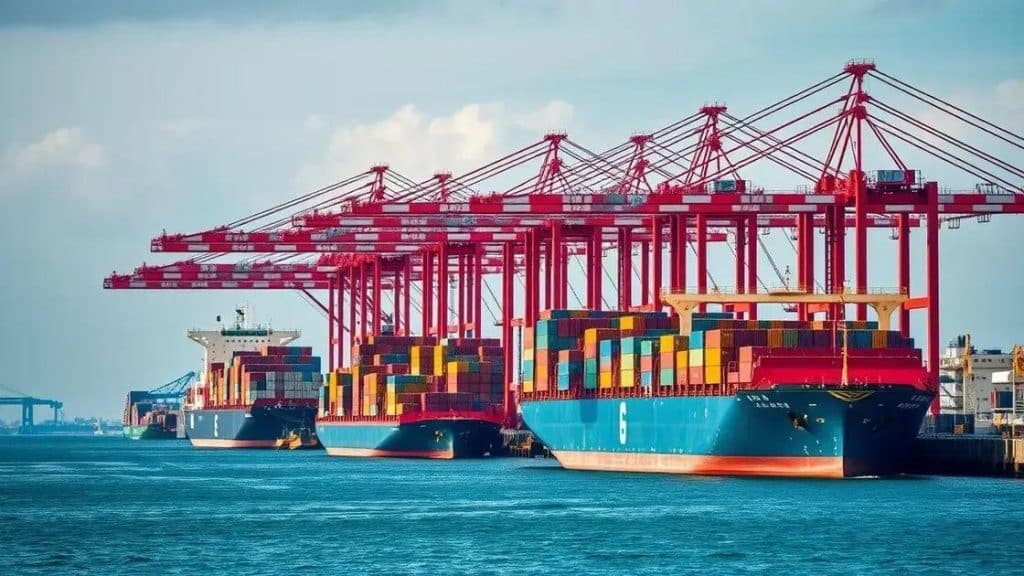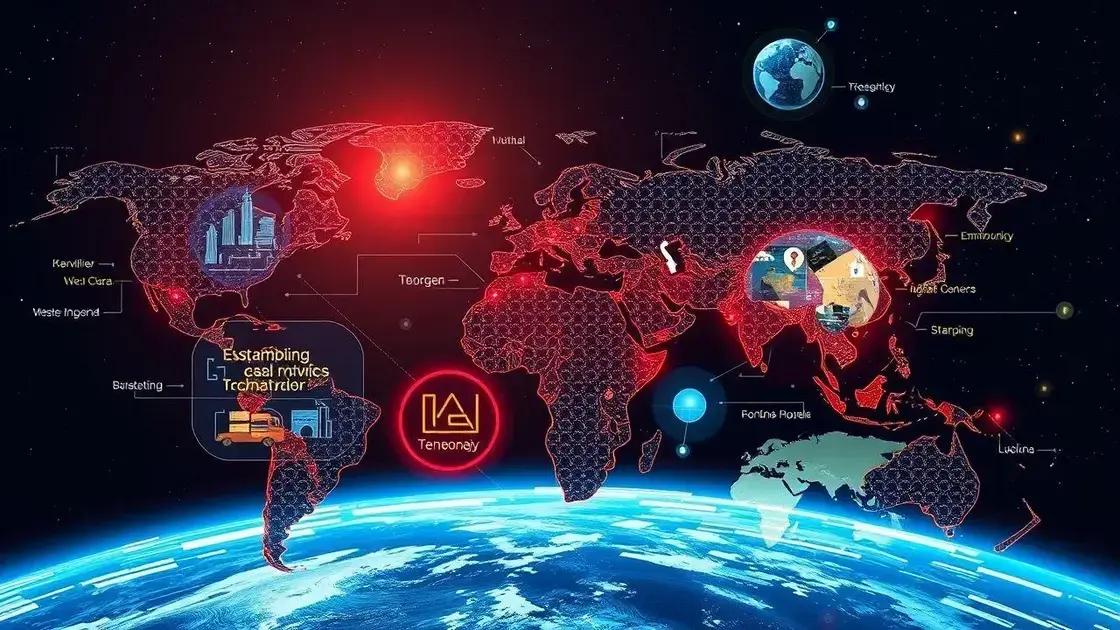US global trade relations: understanding impacts and opportunities

Anúncios
Future trends in global trade relations include technological advancements enhancing efficiency, a growing emphasis on sustainability, and the rise of emerging markets offering new opportunities for businesses.
US global trade relations play a pivotal role in shaping economies around the world. Curious about how these dynamics affect everyday businesses and consumers? Let’s explore the key factors at play.
Anúncios
Overview of US global trade relations
Understanding US global trade relations is crucial for grasping how economies interconnect today. These relations influence not only markets but also diplomatic ties around the world.
The Importance of Trade Relations
Trade relationships can affect pricing, availability of goods, and market competitiveness. When countries work together, they often see benefits in various sectors including technology, agriculture, and manufacturing. US global trade relations help promote economic growth and innovation.
Anúncios
Key Aspects of US Trade Policies
- Tariffs: Taxes imposed on imports can protect domestic industries.
- Trade Agreements: Deals like NAFTA reshape trade flow.
- Import Quotas: Limits on quantities can influence market supply.
- Trade Sanctions: Restrictions can arise from political conflicts.
Trade policies are not just about government decisions; they also involve businesses adapting to changes in the market. Companies often need to adjust their strategies based on these relationships, affecting everything from pricing to product availability. For example, if the US imposes tariffs on a particular product, prices may rise for consumers.
Challenges in Global Trade
Despite the benefits, US global trade relations come with challenges. Trade wars or disputes can arise, impacting economies on both sides. Changes in leadership can also shift priorities, causing uncertainty.
Moreover, evolving technologies and shifts in consumer preferences may create unexpected hurdles. For instance, as more consumers favor sustainable products, companies must adjust their practices, reflecting the demand for greener options in trade agreements.
Key players in international trade

Identifying the key players in international trade helps us understand the dynamics of global markets. These players include countries, multinational corporations, and organizations that shape trade policies and agreements.
Countries as Primary Players
Countries like the United States, China, and the European Union are significant players in the global trading arena. Their economic policies and trade agreements influence international relationships and market access.
- United States: A major importer and exporter, driving global trade with advanced technologies and large consumer markets.
- China: The world’s largest exporter, known for manufacturing a wide range of products.
- European Union: A collective of countries that promotes free trade among its member states, influencing global trade norms.
Each of these countries has specific strengths. For example, the US often leads in technology and innovation, while China excels in manufacturing efficiency.
Multinational Corporations
Strong corporations play a vital role in shaping international trade. Companies like Apple, Samsung, and Toyota not only produce goods but also influence trade policies through their business operations worldwide. These corporations navigate tariffs and trade agreements to maximize profits and ensure supply chain efficiency.
They help facilitate trade by investing in foreign markets, creating jobs, and contributing to the economy. As a result, multinational corporations have a significant impact on how trade flows operate globally.
International Organizations
Organizations like the World Trade Organization (WTO) and the International Monetary Fund (IMF) play crucial roles in regulating and promoting global trade. They establish rules and guidelines to ensure fair trade practices and resolve disputes between countries.
These organizations offer support to developing nations to enhance their participation in global trade. By providing resources and frameworks, they help create a more balanced trading environment.
Impact of trade policies on the economy
The impact of trade policies on the economy is significant and multifaceted. Trade policies dictate how countries interact in the global market, influencing economic growth, job creation, and consumer prices.
Economic Growth and Development
Trade policies can either stimulate or inhibit economic growth. When countries lower tariffs and barriers, it often leads to increased trade, which stimulates economic activity. This growth can result in higher GDP as new markets open up for businesses.
- Increased Exports: Countries can sell more goods and services abroad, boosting local businesses.
- Job Creation: As industries grow, they require more workers, reducing unemployment rates.
- Foreign Investment: Favorable trade policies attract foreign investors, further enhancing economic development.
Conversely, restrictive policies can lead to economic stagnation. When countries impose high tariffs, it can limit trade opportunities and slow growth.
Consumer Prices and Choices
Another critical aspect is how trade policies affect consumer prices. When tariffs are applied, the cost of imported goods rises. This can lead to higher prices for consumers and fewer options in the market.
For example, if a country imposes tariffs on steel imports, manufacturers may face increased costs. They often pass these costs onto consumers, resulting in higher prices for products that use steel, such as cars and appliances.
This situation illustrates why trade policies must strike a balance: protecting domestic industries while encouraging competition that keeps prices down.
Sector-Specific Impacts
Trade policies also have varying effects across different sectors. For instance, agriculture can be heavily impacted by trade agreements. Farmers may benefit from access to new markets, yet they can also face competition from imports. Each sector reacts uniquely to trade policy changes, shaping the overall economic landscape.
Understanding these impacts helps lawmakers create policies that not only support domestic industries but also consider the broader implications on the economy.
Future trends in global trade relations

The future trends in global trade relations hold the key to understanding how economies will evolve. As the world becomes more interconnected, several factors are shaping the landscape of international trade.
Technological Advancements
Technological innovation is driving change in global trade. Automation, artificial intelligence, and blockchain technology are revolutionizing how goods are traded and tracked. These advancements can streamline processes and reduce costs, making trade more efficient.
- Automation: Robotics in warehouses improve order fulfillment speed.
- AI: Predictive analytics helps companies make better inventory decisions.
- Blockchain: Increases transparency and security in transactions.
These technologies can improve supply chain visibility, helping businesses respond faster to market changes.
Shift Towards Sustainability
Another notable trend is the growing demand for sustainable practices in trade. Consumers are increasingly concerned about environmental issues. As a result, companies are adapting to meet these expectations by reducing their carbon footprint and adopting greener practices.
This shift can lead to changes in trade policies, as countries implement regulations that encourage sustainable sourcing and production methods. For instance, agreements may prioritize products made with environmentally friendly practices.
Emergence of New Markets
The rise of emerging markets is another trend reshaping global trade. Countries in Asia, Africa, and Latin America are steadily growing economically. Many businesses are exploring opportunities in these regions, increasing trade connections.
This growth offers new paths for investment and collaboration, allowing companies to reach untapped customer bases. As emerging markets expand, their roles in global trade will become more significant, influencing trade relations worldwide.
The future of global trade relations is shaped by several exciting trends. As technology advances, we’ll see greater efficiency in how goods are traded. Sustainability will be at the forefront, with businesses prioritizing eco-friendly practices. Emerging markets will play a critical role, offering new opportunities for investment and collaboration. Understanding these trends will help individuals and businesses navigate the evolving landscape of trade, ensuring they remain competitive in a fast-changing world.
FAQ – Frequently Asked Questions About Future Trends in Global Trade Relations
What role does technology play in the future of global trade?
Technology enhances efficiency in trade processes, making transactions faster and more secure.
How is sustainability influencing international trade?
Sustainability drives companies to adopt eco-friendly practices, influencing consumer preferences and trade policies.
Why are emerging markets important for global trade?
Emerging markets offer new opportunities for businesses to expand and tap into diverse customer bases.
How can businesses stay competitive in evolving trade relations?
Understanding trends and adapting strategies to align with new trade policies and market changes is essential.





